Breastfeeding Is Hard*
*More accurately, breastfeeding was hard for me. But I found some comfort googling "breastfeeding is hard" & reading the results before dawn during that first month or two, and now maybe someone else will too.
Like labor and delivery, breastfeeding is one of those skills that you can't practice ahead of time. The classes and books and websites make it sound fairly straightforward, like if you take all the right steps you'll automatically have success. Sure, the process is simple and natural. That doesn't mean it's easy, and it certainly wasn't for me.
My milk didn't come in like it was supposed to in the first few days. I had some colostrum in the hospital but Adriana wasn't getting enough once I went home. She lost over 10% of her weight between birth and day 4, and when a newborn loses that much you need to supplement somehow. I had to:
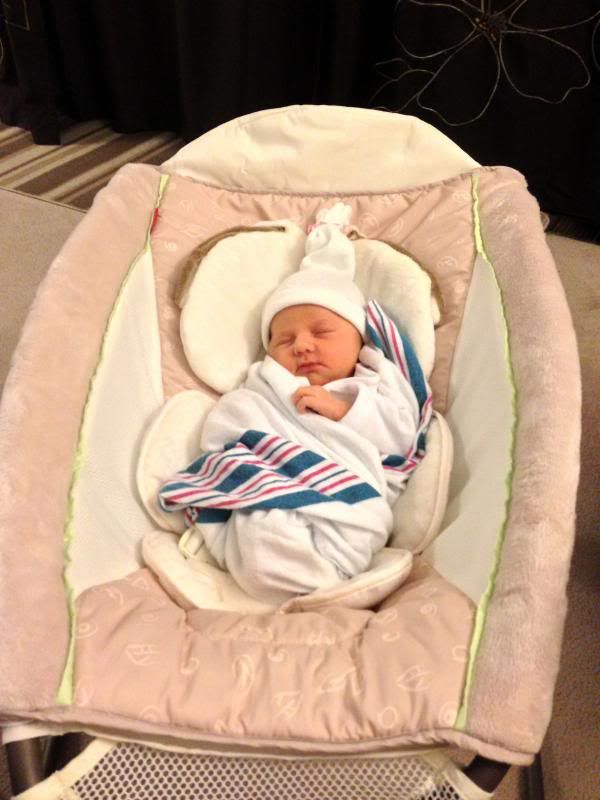
First day home. Sleeping despite not getting much milk.
Once my supply finally came up and I felt like it was safe to stop pumping as much, we had some latch issues. I got blisters and it hurt to feed her - imagine grabbing a blister with a clothespin 6-8 times a day. It was awful. I had to limit how much time she spent nursing which meant we were back to bottles & pumping so she could get enough volume. A breastfeeding group helped me figure out I was positioning her wrong and the blisters slowly healed.
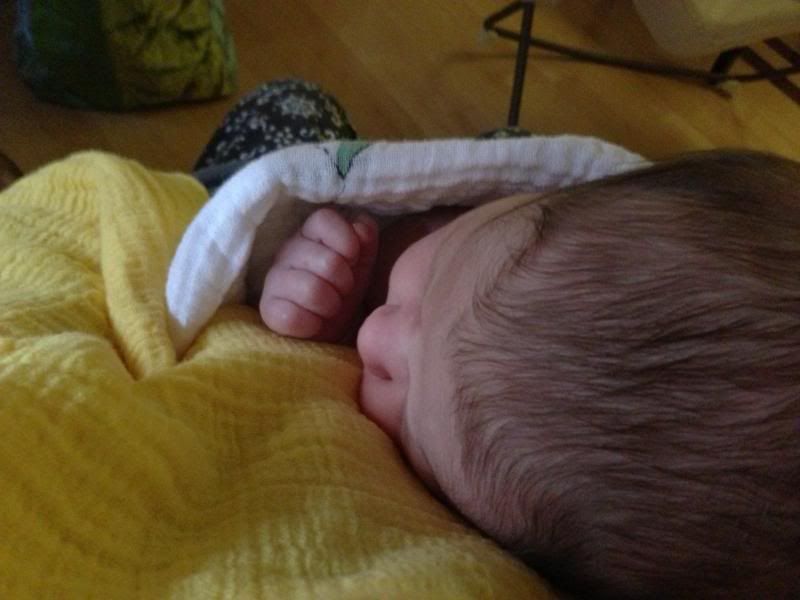
Around 3 weeks. I took this photo to remember what my post-feeding view was like.
It took me 6 weeks to feel like things were improving, and 8 weeks before it started to feel easy. 6 weeks is a long time to devote most of your time to producing milk. 6 weeks is a long time to question whether you'll ever be able to leave the house without bottles and a pump. 6 weeks is a long time to listen to your sleep-deprived hormone-addled jerkbrain telling you you're failing at feeding your baby, the one single requirement that parents absolutely must meet.
After all that initial struggle things smoothed out. I ended up nursing for a little over 17 months.
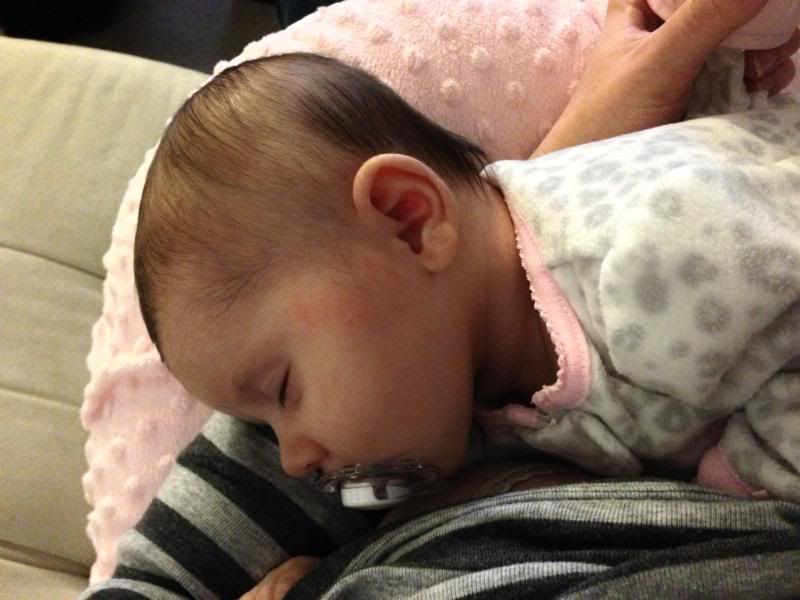
Another post-nursing nap at 2 months.
I've got some tips to offer about the first few months (based entirely on my experience, so of course YMMV).
1. Understand the system
Breastfeeding is a feedback loop. Breasts produce milk -> The baby sucks and swallows -> Breasts are emptied -> Breasts produce milk. An issue in any part of the cycle messes up the whole cycle. It's not always clear what the issue is - was I not producing milk because Adriana fell asleep every time she ate, or was she falling asleep because she wasn't getting any milk? Don't laugh, but my engineering background helped me here. In the first few days I understood that the Kate-Adriana system just wasn't in sync yet, that I was probably only a few days or a week behind her. The problem is that a few days make a big difference for a baby who is only a few days old, so outside intervention into the system was needed. The pump took care of the emptying/producing and I focused on getting her to sleep between feedings to help with the sleepiness. It also helps to understand that sometimes things just get easier as time goes on and the baby gets bigger and better at sucking.

An early morning on the couch during her first trip to the Cottage.
2. Plan ahead for help
Trust me, you don't want to be trying to compare lactation consultant prices, buying a pump, or looking for support groups in the first week after birth. Carlos did most of this but he was getting as little sleep as I was so it still wasn't easy. Remove all possible barriers to getting help before the baby comes. I would suggest:
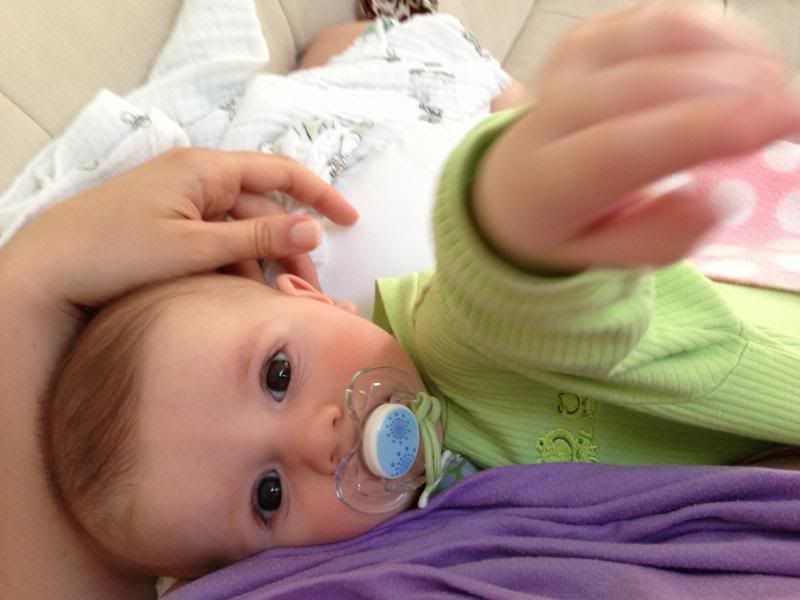
At 5 months the post-milk naps started to be less frequent.
3. Learn some tricks - here were mine
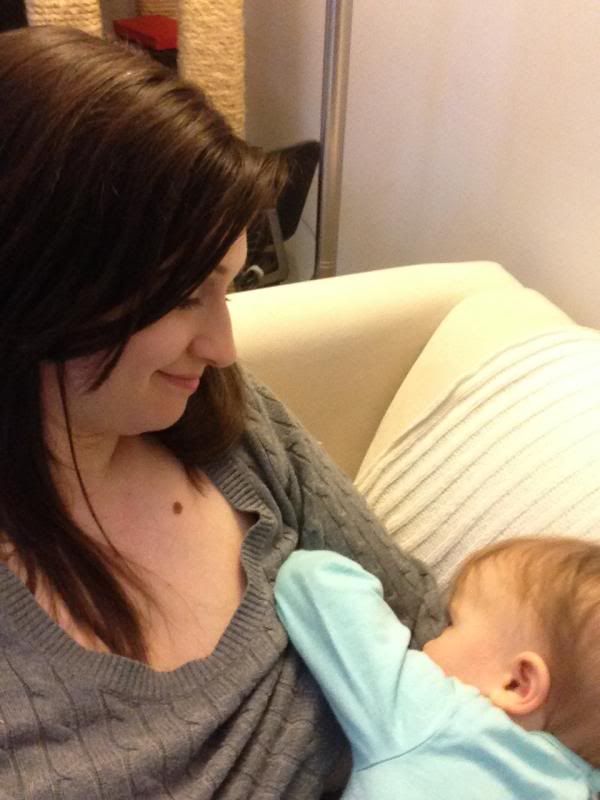
~16 months. I took a photo because I knew we were getting to the end of nursing. My supply didn't stick around too long after I quit pumping at work.
4. Have reasons to be stubborn
Of course breast milk is good for babies. You know what else is good for babies? A parent who has the physical, emotional, and financial resources to care for them. Breastfeeding is incredibly taxing if it doesn't work easily. It requires money, time, energy, and help that you just might not have. It's not encouraged by current (nonexistent in the US) maternity leave policies. If you manage to breastfeed for even just a day, your child will get benefits. But as important as the first year is it doesn't define your child's life. If trying to breastfeed is killing you, it's OK to use formula, I swear. Your child won't love you any less and neither will I.

Moving on to new dairy products.
Good luck!
Like labor and delivery, breastfeeding is one of those skills that you can't practice ahead of time. The classes and books and websites make it sound fairly straightforward, like if you take all the right steps you'll automatically have success. Sure, the process is simple and natural. That doesn't mean it's easy, and it certainly wasn't for me.
My milk didn't come in like it was supposed to in the first few days. I had some colostrum in the hospital but Adriana wasn't getting enough once I went home. She lost over 10% of her weight between birth and day 4, and when a newborn loses that much you need to supplement somehow. I had to:
- breastfeed a slow-eating, uncoordinated, sleepy-ass tiny baby
- bottle feed pumped milk (followed by formula during the first week)
- burp her
- get spit up everywhere
- clean up spit up
- change her diaper eleventy billion times because newborns are like that
- get her calmed down enough to sit in her bin at least semi-quietly
- pump for the next feeding

First day home. Sleeping despite not getting much milk.
Once my supply finally came up and I felt like it was safe to stop pumping as much, we had some latch issues. I got blisters and it hurt to feed her - imagine grabbing a blister with a clothespin 6-8 times a day. It was awful. I had to limit how much time she spent nursing which meant we were back to bottles & pumping so she could get enough volume. A breastfeeding group helped me figure out I was positioning her wrong and the blisters slowly healed.

Around 3 weeks. I took this photo to remember what my post-feeding view was like.
It took me 6 weeks to feel like things were improving, and 8 weeks before it started to feel easy. 6 weeks is a long time to devote most of your time to producing milk. 6 weeks is a long time to question whether you'll ever be able to leave the house without bottles and a pump. 6 weeks is a long time to listen to your sleep-deprived hormone-addled jerkbrain telling you you're failing at feeding your baby, the one single requirement that parents absolutely must meet.
After all that initial struggle things smoothed out. I ended up nursing for a little over 17 months.

Another post-nursing nap at 2 months.
I've got some tips to offer about the first few months (based entirely on my experience, so of course YMMV).
1. Understand the system
Breastfeeding is a feedback loop. Breasts produce milk -> The baby sucks and swallows -> Breasts are emptied -> Breasts produce milk. An issue in any part of the cycle messes up the whole cycle. It's not always clear what the issue is - was I not producing milk because Adriana fell asleep every time she ate, or was she falling asleep because she wasn't getting any milk? Don't laugh, but my engineering background helped me here. In the first few days I understood that the Kate-Adriana system just wasn't in sync yet, that I was probably only a few days or a week behind her. The problem is that a few days make a big difference for a baby who is only a few days old, so outside intervention into the system was needed. The pump took care of the emptying/producing and I focused on getting her to sleep between feedings to help with the sleepiness. It also helps to understand that sometimes things just get easier as time goes on and the baby gets bigger and better at sucking.

An early morning on the couch during her first trip to the Cottage.
2. Plan ahead for help
Trust me, you don't want to be trying to compare lactation consultant prices, buying a pump, or looking for support groups in the first week after birth. Carlos did most of this but he was getting as little sleep as I was so it still wasn't easy. Remove all possible barriers to getting help before the baby comes. I would suggest:
- Make sure your co-parent is on board. I wouldn't have been able to do this without Carlos helping me to get sleep and without him supporting how hard I was trying. He never tried to convince me to give up, even when it was hard for both of us.
- Have family or friends lined up to come help for as long as possible (I'd do this even if you aren't planning to breastfeed!). I was so lucky, I don't think I had more than a handful of daytimes completely on my own for the first 6 weeks.
- Compare prices and choose a lactation consultant ahead of time. Consider one that does house calls - there was no way I was going somewhere that first weekend I needed professional help.
- Compare prices for hospital pump rentals. Hospital pumps work better than regular ones to get the milk to come in initially (no one seems to know why). See if your insurance will cover this.
- Talk to your insurance company now about a regular pump. They are supposed to provide one for free now (thanks, Obama!) but they may make you jump through hoops to get it so it could take a while (I ended up buying one myself).
- Find a breastfeeding support group near you. La Leche League is a place to start but the groups in my area only meet once a month. A friend recommended a free weekly group at a hospital nearby and this was so much help. I could weigh Adriana before and after feeding to see how much she was drinking. Being in a group meant that people asked questions I wouldn't have thought to, so I learned more than I might have in a one-on-one session.

At 5 months the post-milk naps started to be less frequent.
3. Learn some tricks - here were mine
- Drink TONS OF WATER, especially if you're pumping. My pumping output (not necessarily production) fell whenever I skipped my daily water bottle.
- Homemade APNO saved me from blisters twice.
- If you suddenly can't pump any milk, check all of the pump parts for breakage before deciding it's your breasts' fault and freaking out again (oops).

~16 months. I took a photo because I knew we were getting to the end of nursing. My supply didn't stick around too long after I quit pumping at work.
4. Have reasons to be stubborn
- Figure out why you want to keep going through pain or setbacks and hold on to that when things get tough. Here's where I should list things like "antibodies" and "higher IQ" that benefit the baby. But nope! I was stubborn about getting breastfeeding to work because it was going to benefit me. No warming bottles when she's yelling in the middle of the night, no packing coolers and bottles on a walk, no having to remember one more thing at the grocery store. I wanted to take her birding or to museums without bringing a pump. I saw breastfeeding as freedom and I apparently wasn't going to let that vision go. (I never managed to take her birding or to museums but I did nurse while hiking and on a plane, among other places.)
- My friend silberzauber told me she knew people who didn't get it working for 2-3 months, so I had hope that I wasn't a lost cause after 6 weeks.
- Some days I had to tell myself "I'll just breastfeed until the support group meeting next week and then quit" or even "I'll just get through today and quit tomorrow" and repeat as necessary.
- It started to become important to me to make it to a year of breastfeeding simply because it was important to me to do that, if that makes any sense? I'm not always the best at sticking with something that matters to me, but this time I made myself do it. Once again I'm selfish and more proud of that than proud to have benefited Adriana.
Of course breast milk is good for babies. You know what else is good for babies? A parent who has the physical, emotional, and financial resources to care for them. Breastfeeding is incredibly taxing if it doesn't work easily. It requires money, time, energy, and help that you just might not have. It's not encouraged by current (nonexistent in the US) maternity leave policies. If you manage to breastfeed for even just a day, your child will get benefits. But as important as the first year is it doesn't define your child's life. If trying to breastfeed is killing you, it's OK to use formula, I swear. Your child won't love you any less and neither will I.

Moving on to new dairy products.
Good luck!